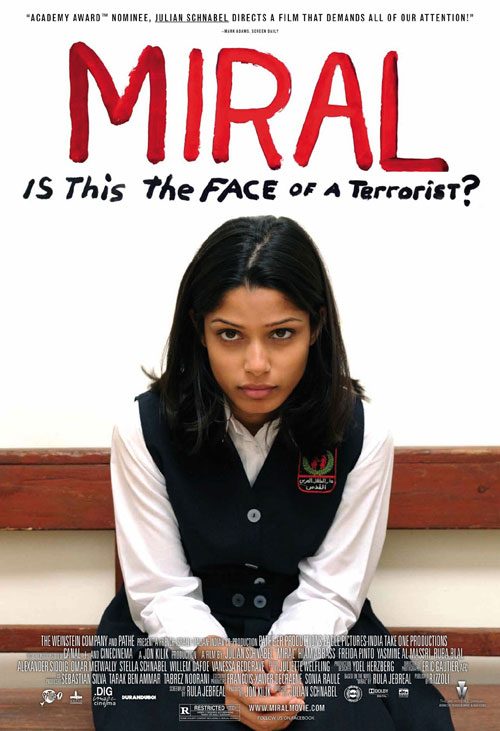The one film I was most looking forward to at the Dallas International Film Festival was Miral (2011), a film by The Diving Bell and the Butterfly director Julian Schnabel. Since the time I saw the first trailer I had read responses to the film calling it controversial due to it’s portrayal of the Israeli’s. I was definitely intrigued since the filmmaker is Jewish and the way the story was going against the grain. It was definitely shaping up to be unforgettable, and I’m all about films that try to do something different.
The issue that struck me way back when I first saw the trailer was Freida Pinto (Slumdog Millionaire). To me, I felt casting an Indian woman in an Arabic role stuck out like a sore thumb, but it wasn’t anymore than a passing thought at the time. They do it all the time, in fact one of my favorite movies of all time is Alive (1992), which has a set of some of the most laughable casting ever with white actors bearing names like Nando Parrado and Roberto Canessa. Nevertheless I enjoyed that film immensely so of course casting doesn’t matter much until after I see the role played out.
So yeah, I watched the film. And when Freida Pinto is on screen, all I saw was Freida Pinto on screen. This was such a disappointment to me because the film was so masterfully put together, and so thoughtfully orchestrated, that it boggles the mind as to why Julian Schnabel cast Freida. I did my research, and looked at the real life character of Miral. Her name is Rula Jebreal and Miral is her alter ego, on screen that is. The film is based on her. It’s an autobiographical account of the events she has experienced as a Palestinian. Her book preceded the movie, and she also adapted the screenplay. A quick glance at her picture and you might say she is Indian, like Freida. Maybe that’s why they cast Frieda? Next time I see Julian Schnabel I’ll ask, but I don’t think he’ll be doing much press for this film. She doesn’t work for the film, and the film suffers immensely for it. It’s unfortunate because the film is incredible outside of the title character.
Hiam Abbass (The Visitor) is always a treat to watch and is without a doubt the best performance in the film. The images are beautiful. The sunlit countrysides of Palestine and Israel are beautifully captured on good ol’ 35mm film. The film takes us through the history of the conflict there through the use of archival footage and on screen text. It is never distracting, unlike Freida.
It’s sad how the beautiful subtleties in the cinematography and the acting all contribute to a sense of realism in the film, but what shatters all of that intricate effort and renders it irrelevant is nothing less than the title role. See it for the history, and the perspective of the conflict, but get ready to be yanked out of the film every time you-know-who is on screen.












Wow what a horrible review. What do you Critic again?
Please elaborate.